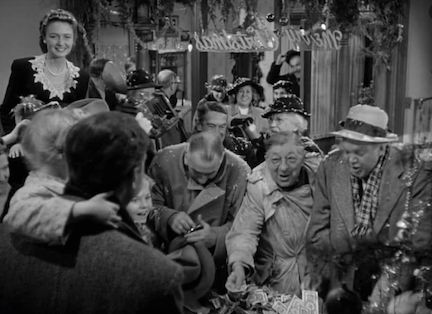Useful Tools
Any of us with children know the experience of our little ones wanting to "help" when we we're in the middle of some grown-up activity or project. Picture yourself in the middle of some home repair when your 5 year old comes out of the house with their toy tools and tool belt, saying, "I want to help you, dad." Our initial reaction may be to shoo them asside and tell them that we will play with their toys later, knowing that they would be more in the way than anything.
That's when we realize that in their mind, their tools (although made of plastic) were real tools, and that their abilities (as limited as they are) are useful for the job. You can see in their little eyes a true desire to help, a true desire to make their mom or dad proud.
We know that if we allow them to "help" it will likely make the job less efficeint and more cumbersome. But in that moment we realize that the effeciency of the job is so much less important than the joy (and experience!) our child would get from helping us.

As we consider such a scenario, we cannot help but see the Word of God in plain sight. God desires for us to follow Him and serve Him. He desires us to join him in the work of the ministry and in reaching the lost with the Gospel. But we're like clumsy, ill-equipped children in His service.
Truly, God does not "need" our help. He can accomplish much with or without us. Yet, over time, he will provide us increasingly more sophisticated tools as he hones our gifts and abilities, and we will become increasingly more useful co-laborers in the work of His ministry.
"All Scripture is breathed out by God and profitable for teaching, for reproof, for correction, and for training in righteousness, that the man of God may be complete, equipped for every good work" (2 Timothy 3:16-17, ESV).
"Now may the God of peace, who through the blood of the eternal covenant brought back from the dead our Lord Jesus, that great Shepherd of the sheep, equip you with everything good that you may do his will, working in us that which is pleasing in his sight, through Jesus Christ, to whom be glory forever and ever. Amen" (Hebrews 13:20-21, ESV).
"For we are his workmanship, created in Christ Jesus for good works, which God prepared beforehand, that we should walk in them" (Ephesians 2:10, ESV).
Smiling, Happy Faces, Filling a Void, Accomplishing Nothing
If you’ve ever been to a Costco to shop, you know that you cannot leave the store without showing your receipt to an exit attendant who will dutifully match your receipt against the items in your cart to be sure you haven’t “forgotten” to pay for anything.
Well, a recent trip to the retail giant produced quite a Wait. What?! moment as we were exiting the store with our full-to-overflowing shopping haul.
The friendly, smiling exit attendant asked for our receipt, and we promptly produced it. She scanned the receipt, then our cart, then the receipt again. She then humbly apologized that it was taking so long, informing us that she just needed to find the rib roast (we know — a BIG extravagance!) we had just paid for. After another moment, she said, again with a big, bright smile, “Ahhh, there it is! Have a nice day.”
Then came the, Wait. What?! moment.
She was supposed to be looking first at our cart, then comparing the items in our cart to what was on our receipt, not the reverse, looking at the items on our receipt to see if they were in our cart. She had gotten the proverbial cart before the horse, or in this case, the receipt before the cart!

Clearly, this bubbly, smiling attendant didn’t quite grasp the concept of the job she had been engaged to perform. We can just hear the convo in the break room: “I don’t understand why everyone is so worried about shoplifting. I’ve been working here for a month now and I’ve never found anything even remotely suspicious.” Well, no wonder … you’re so kind, so polite, so well intentioned, but you’re not doing your job correctly!
She was motivated to find items we’d paid for, but might have forgotten, while the management wanted her to be motivated to find the items we might be taking that we hadn’t yet paid for.
Sadly, she was a smiling, happy face, filling a void, accomplishing nothing.
As believers, we engage in acts of service and devotion every day — in our homes, our churches, our places of employment, our communities, with nothing but the best attitudes and the best intentions. Yet we are often no more effective in our acts of service and devotion than that confused Costco attendant was at performing her one, very simple task.
Why? Because motivation matters!
Scripture is clear, anything not done in love, is useless.
When religiosity replaces relationship or rote actions replace agape [God's love], we become nothing more than smiling, happy faces, filling voids, accomplishing nothing.
Let everything you do be done in love [motivated and inspired by God’s love for us] (1 Corinthians 16:14, AMP).
If I speak in the tongues of men or of angels, but do not have love, I am only a resounding gong or a clanging cymbal. If I have the gift of prophecy and can fathom all mysteries and all knowledge, and if I have a faith that can move mountains, but do not have love, I am nothing. If I give all I possess to the poor and give over my body to hardship that I may boast, but do not have love, I gain nothing (1 Corinthians 13:1-3, NIV):
It's a Wonderful Wife
A recent Facebook post takes a new look at an old classic:
I realized something while watching "It's a Wonderful Life" recently. It was something I missed the first 3,317 or so times I watched it. That is, I think the hero of the story isn't George, it's Mary.
The movie starts off with Mary praying for God to be with George. Her prayer (and others) is the catalyst for the angel, Clarence, being sent to George. Mary is the one who sees the beauty of the old broken down house. "It's full of romance, that old place." George sees empty space; Mary sees a space that can be filled with a family's love.
That's why George kisses the broken banister knob in the end; he finally sees what Mary always saw in that house. Mary saw it on the day of their wedding. She was the one who transformed the house into "honeymoon suite." Of course, that happened after she had the idea to offer her $2000 honeymoon money to the people of the town during the bank run. When George is depressed by his friends moving onward and upward in the world and think he's a disappointment to his wife because of it, Mary makes it clear that she "didn't want to marry anybody else in town." Never complaining, she worked "day after day remaking the old Granville house into a home." This while having 4 children and running the USO.
Finally, Mary is the one who goes all over town to ask for help for her husband. Uncle Billy remarks, "Mary did it, George! Mary did it!" I had never noticed her expression before when Uncle Billy says this. She's in the background as he says it, and she mouths "No..." while she shakes her head and moves further into the background. It's an incredibly subtle but important feature of her character: do good for others, but let others receive the credit. She moves fully into the background so that everyone giving money to George can come front and center. This was all orchestrated by Mary but she fades into the background.
Now look at the picture below where Mary is again in the background. Note where she's positioned: over George's shoulder. The one watching over George all these years was Mary. She was as much a guardian angel to George as Clarence was.

The post continues ...
In the end, George was a good man; even a great one. He was after all, "The richest man in town." But would he have accomplished all he did, and been the man he was without Mary? I think the answer is definitely not. And there are many such Marys in this world who quietly go about, offering their prayers, works, and sufferings; raising their children; praying for their husbands and making them 10x the men they would have been without them.
Most of their deeds won't be known this side of heaven. Until they're known, we, the Georges of this world, offer to you Marys our profound thank you. And we promise to keep trying to lasso the moon for you. You deserve nothing less.
"An excellent wife who can find? She is far more precious than jewels. The heart of her husband trusts in her, and he will have no lack of gain. She brings him good, not harm, all the days of her life" (Proverbs 31:10-12, ESV).